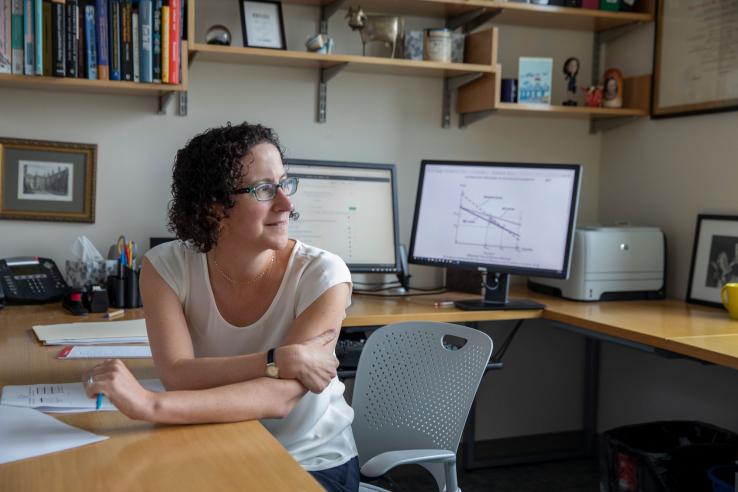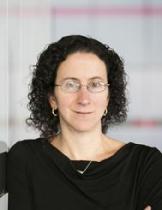
Affiliate spotlight: An interview with Amy Finkelstein on how her recent MacArthur Fellow award opens up new possibilities in innovative research

Amy Finkelstein is the John & Jennie S. MacDonald Professor of Economics at the Massachusetts Institute of Technology and the Co-Scientific Director of J-PAL North America. She was recently selected as a recipient of a 2018 MacArthur Fellowship, "a no-strings-attached grant for individuals who have shown exceptional creativity in their work and the promise to do more."
First of all, congratulations! This a great achievement—of course well deserved; we’re all thrilled for you. Where were you when you found out you had won the award, formerly known as a “genius” grant? Can you tell us a little bit about what that experience was like?
It was surreal. I was where I often am: in my office working. I got an email from someone at the MacArthur Foundation saying, "I want to follow up on our previous email, is there a time we can talk?" Because I’ve had conversations with them about various topics, I wasn’t sure which conversation they were referring to. But when a funder reaches out to you, you try to respond promptly. So I said, "Sure, I’m in the office, give me a call."
They called and told me I’d won a MacArthur Award! I had no idea this was in the possibility set; I was totally stunned. I actually at first thought it was a prank. I have some friends and colleagues with a sense of humor and I thought maybe one of them was going to burst in my office saying, "Gotcha!" I thought, "Am I on candid camera?" I was stunned.
The conversation lasted about ten minutes, but then they sensibly sent me a follow-up email that said, "You may not have been able to fully focus, but first of all, we want to assure you this is real." By the time I got that email I was starting to wonder if I’d imagined it, so that was well-timed!
Who initially nominated you for the MacArthur Award?
I don’t know! As they say on their website, I don’t even know who the set of nominators are. It’s kind of fun, you can just enjoy the thought that there’s someone out there who thinks well of you.
We’ve heard that you are only allowed to tell one person about the award—who did you tell? How did it feel to know you had won and not be able to tell anyone else?
They were very clear you could only tell one person, and I have two parents. So I told my husband Ben, instead. He works upstairs from me so I went up to his office but he wasn’t there. I texted him "Where are you? I need to talk with you and came by your office…".
He appeared a few minutes later in my office and said "What did I do?" After I told him, his reaction was "Wow!" I think he was relieved he hadn’t done anything wrong!
I have a very close co-author who I do an enormous amount of work with, who I also talk to every day, and I also didn’t tell him. When he found out a month later, he started his email with, "I can’t believe you’ve known for a month—" and I thought he was going to say "and you didn’t tell me," but then I clicked on it and it said "—and didn’t tell your parents! What kind of daughter are you!"
Can you tell us a little bit more about the day of the announcement?
It was really fun! I’d spent a month knowing and of course no one has any reaction because no one knows, so you start thinking, “Maybe I overreacted… maybe it’s not that big a deal.”
The announcement came out at noon, and I was on a work call with two of my co-authors and a graduate student. We were struggling with a hard problem, we were kind of stuck—and then one of my co-authors suddenly goes “Hey, whoa, congratulations!” and the other said “What happened?”
After he explained that I had won, the other said, “I guess I’m not the only one who checks my email while we’re working!”
Then, our department head, Nancy Rose, was amazing and organized a reception that afternoon. And that evening I celebrated, as one always does, by going to middle school curriculum night at my son’s school!
I have been flooded with emails. It’s been so nice. People whom I knew well in high school, or college, or after college—but had lost touch with—have reached out. It’s been a great opportunity to reconnect and to learn what they’ve been doing for the past 25 years. That’s been fun.
Do you have a sense yet of what this award will enable you to do professionally?
Personally, for me one of the most exciting things is that the MacArthur Foundation makes it clear that this award is not given for lifetime achievement. It’s based on promise and potential, so it’s very exciting and encouraging to me to know that there are people out there who are betting I’m going to do something interesting in the future! I want to make sure I live up to their expectations, or at least try my best to.
I love my research, I love advising students, and I love my work at J-PAL North America, and I’m really excited to continue doing all of those things.
The fact that the Foundation and the people on the committee also think we’re doing important work, and that this work has the potential to have even more impact going forward… it’s a real confidence boost for what you come into the office every day to try to do.
Are there any projects you feel are more feasible now that you have this flexible source of funding?
Because the grant has no reporting requirements, it’s really flexible, which is really hugely advantageous. As you know, we also try to facilitate flexibility at J-PAL with our short, rapid turnaround proposals.
A lot of foundations and US government funders, for good reason, want to see that you’ve thought your project through and that it’s likely to work before they’ll fund it. But that’s hard to do, especially when you’re trying to do something that is really resource-intensive and you don’t yet have the resources.
While I understand why the world works that way, at J-PAL we try to make it easier to take risks. This kind of grant similarly allows me and my research team to take some risks and try some speculative things before we get the funding for it, so I think that’s very exciting. This grant has given me the freedom to try and think about those types of projects.
I was having a conversation the other day with colleagues about a potential project and the question came up: “But how could we fund it?” Now, it’s not like I can fund all of my research for the rest of my life, but this funding just allows me to have more breathing room.
I hope it also brings attention and recognition to J-PAL North America as an organization and the work we’re all doing there, which is in the spirit of this award—bringing rigorous evidence to bear on important policy questions.
Hopefully more people will hear more about what we’re doing and be interested in learning more about how to use evidence to improve public policy.
To see more of Amy’s work, visit our evaluation database.


